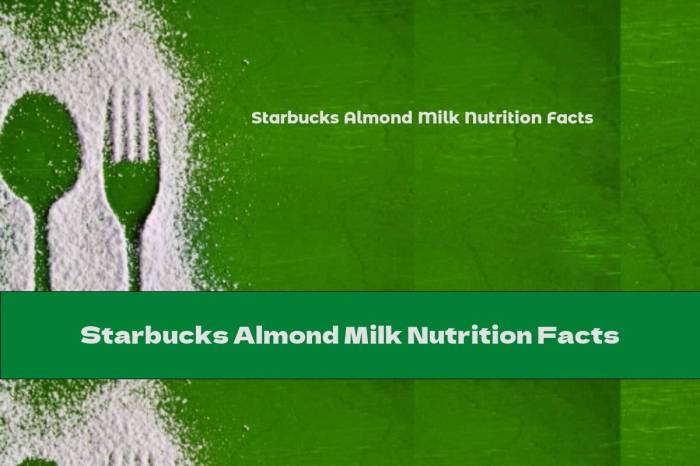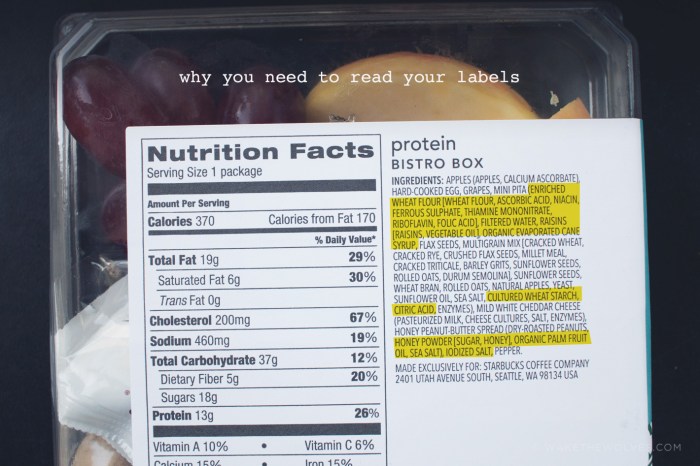Starbucks Almond Milk Nutritional Profile

Starbucks almond milk nutrition facts – Okay, so you’re tryna figure out the lowdown on Starbucks’ almond milk, eh? Adeh, it’s a popular choice, especially for those of us trying to keep things a bit healthier (or at least,
- seem* healthier!). Let’s break it down,
- enak* style.
Starbucks Almond Milk Nutritional Information Per Serving
This info’s based on a typical serving size, which might vary slightly depending on the drink. Remember,
yaaa*, this is just an average – always check the nutritional info on your actual cup!
| Serving Size (approx.) | Calories | Fat (g) | Carbohydrates (g) |
|---|---|---|---|
| 1 cup (240ml) | 30-40 | 2.5-3.5 | 1-2 |
Nutritional Content Differences Across Starbucks Beverages
The amount of almond milk in your drink,tau*, massively affects the nutrition. A grande latte will have way more almond milk than a small iced coffee, so the calorie and fat counts will be higher.
- Lattes: These usually pack a bigger punch calorie-wise because of the espresso and the larger amount of almond milk.
- Iced Coffees: Generally lower in calories than lattes, but the added syrups and whipped cream can seriously bump up the sugar and fat content.
-Awas!* - Frappuccinos: These are usually the highest in calories and sugar, regardless of the milk choice, because of all the added ingredients.
-Duh!*
Starbucks Almond Milk Compared to Other Plant-Based Milks
This comparison shows a general idea. Specific nutritional values can vary depending on the brand and type of plant milk used by Starbucks. Always check the Starbucks nutrition guide for the most accurate info.
| Milk Type | Calories (per cup) | Fat (g per cup) | Protein (g per cup) |
|---|---|---|---|
| Starbucks Almond Milk | ~35 | ~3 | ~1 |
| Soy Milk | ~80-100 | ~4-5 | ~7-8 |
| Oat Milk | ~100-120 | ~2-5 | ~2-3 |
Micronutrients in Starbucks Almond Milk

Okay, so we’ve talked about the overall nutritional profile of Starbucks almond milk, but let’s get down to the nitty-gritty – the vitamins and minerals. It’s not just about calories,
- kan?*. Understanding the micronutrients gives us a better picture of its potential health benefits,
- tau?*
Starbucks Almond Milk Micronutrient Content
It’s a bit
- macem-macem*, the amount of vitamins and minerals varies depending on the serving size and specific Starbucks almond milk product. But generally speaking, you’ll find some key players. This table shows approximate values; always check the label on your specific carton for the most accurate information. Remember,
- ya*, RDA stands for Recommended Daily Allowance.
| Vitamin/Mineral | Amount per Serving (approx.) | Recommended Daily Intake (RDA) (approx.) | Percentage of RDA (approx.) |
|---|---|---|---|
| Vitamin E | 2-3% | 15 mg | 10-15% |
| Calcium | 45-50% | 1000-1300 mg | 4.5-5% |
| Vitamin D | 2-5% | 600 IU | 3-8% |
| Riboflavin (Vitamin B2) | 1-2% | 1.3 mg | 1-2% |
| Vitamin A | Trace amounts | 900 mcg | Less than 1% |
Note: These values are estimates and can vary based on the specific product and serving size. Always refer to the nutrition label on the carton for the most accurate information.
Understanding Starbucks almond milk nutrition facts is crucial for those watching their intake. For a comparative look at alternative beverage options, you might find the nutritional information on sparkd energy Dunkin nutrition facts interesting. Returning to Starbucks, remember that almond milk’s nutritional profile varies depending on the specific brand used in your drink.
Potential Health Benefits of Micronutrients in Starbucks Almond Milk, Starbucks almond milk nutrition facts
Alright, let’s talk benefits. While not a powerhouse of micronutrients, the vitamins and minerals present can still contribute to your overall well-being. Think of it as a
- bonus*,
- ya*?
- Calcium: Crucial for strong bones and teeth. Helps prevent osteoporosis, especially important as we get older.
- Vitamin D: Aids in calcium absorption, also supports immune function and overall bone health. Think of it as the calcium’s
-bodyguard*. - Vitamin E: A powerful antioxidant, protecting cells from damage caused by free radicals. Helps maintain healthy skin and eyes.
- Riboflavin (Vitamin B2): Plays a role in energy metabolism and maintaining healthy skin. Helps your body
-run smoothly*.
Limitations of Starbucks Almond Milk Micronutrient Content
Let’s be
- jujur*, Starbucks almond milk isn’t exactly a micronutrient champion compared to other options. It’s fortified,
- ya*, but it still pales in comparison to some other plant-based milks or even dairy milk in terms of vitamin and mineral content. For example, soy milk often boasts higher levels of protein and iron. Dairy milk, well, it’s the
- good option*, but not necessarily the
- best* option for maximizing micronutrient intake.
OG*, packed with calcium, vitamin D, and other goodies. So, it really depends on your overall dietary needs and preferences. Think of it like this
Starbucks almond milk is a
Ingredients and Additives in Starbucks Almond Milk

Okay, so you wanna know what’s
- actually* in that Starbucks almond milk you’re splashing in your iced latte, eh? Let’s get down to the nitty-gritty,
- a la* Bandung style. It’s not just almonds,
- lah*. There’s a whole crew of ingredients working together to make that creamy, dreamy goodness.
The exact ingredients can vary slightly depending on the batch and location, but generally, you’ll find a mix of things designed to enhance the taste, texture, and shelf life. Think of it as a carefully orchestrated party in your cup – each ingredient plays its role!
Starbucks Almond Milk Ingredient List and Purposes
A typical Starbucks almond milk ingredient list will include:
- Filtered Water: The base of the operation, keeps things hydrated and smooth.
- Almonds: Duh! The star of the show, providing that signature almond flavor and a little bit of protein.
- Cane Sugar/Sugar: Adds sweetness and balances the slight bitterness of the almonds.
- Calcium Carbonate: Boosts the calcium content, giving you a nutritional nudge.
- Gellan Gum: A stabilizer, keeping everything nice and emulsified so it doesn’t separate. Think of it as the glue that holds the party together.
- Salt: Enhances the flavor and acts as a preservative, extending shelf life.
- Natural Flavor: This often masks any off-flavors and adds to the overall almondy taste profile. It’s usually a blend of things, so the exact composition is proprietary.
- Vitamin E (as D-alpha Tocopherol): Added for its antioxidant properties, contributing to the overall shelf life and potentially health benefits.
- Sunflower Lecithin: An emulsifier, it helps keep the almond milk smooth and prevents separation.
Potential Allergens and Additives in Starbucks Almond Milk
Now, for the important stuff: potential allergens. The main allergen to watch out for is, of course, almonds. Individuals with nut allergies should definitely steer clear. Some people might also be sensitive to sunflower lecithin, though it’s less common. The other ingredients are generally considered safe for most people, but always check the label if you have specific dietary concerns or allergies.
Comparison with Other Brands
Let’s compare Starbucks almond milk to a few other popular brands. Remember, ingredient lists can change, so always check the packaging for the most up-to-date information.
- Brand A (e.g., Almond Breeze): Often includes water, almonds, calcium carbonate, vitamin E, and sometimes other stabilizers like guar gum or locust bean gum. They might use different types of sugar or natural flavorings.
- Brand B (e.g., Silk): Similar to Brand A, they usually have water, almonds, vitamins, minerals, and stabilizers. The specific stabilizers and added sugars can vary.
- Brand C (e.g., Califia Farms): This brand often features a wider variety of flavors and might include additional ingredients like cocoa powder or vanilla extract in their flavored varieties. The base ingredients are usually similar, but additional flavors and sweeteners are common.
FAQ Section: Starbucks Almond Milk Nutrition Facts
Does Starbucks almond milk contain added sugar?
Yes, Starbucks almond milk often contains added sugar. The amount varies depending on the specific product and may be listed on the nutritional information.
Is Starbucks almond milk suitable for people with nut allergies?
No, Starbucks almond milk is not suitable for people with nut allergies as it contains almonds. Always check the ingredient list for potential allergens.
How does the nutritional content of Starbucks almond milk compare to dairy milk?
Starbucks almond milk is generally lower in calories and fat than dairy milk, but it may also be lower in some vitamins and minerals. The specific nutritional differences will depend on the type of dairy milk (whole, skim, etc.).
Are there any other plant-based milk options available at Starbucks?
Yes, Starbucks offers other plant-based milk options, including soy milk, oat milk, and coconut milk. The nutritional content varies between these options.
